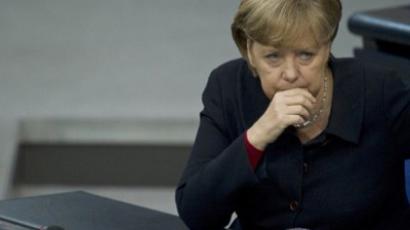EU summit: Last-chance saloon for eurozone project
This week’s EU summit is being seen as the last chance for the eurozone. But as European leaders make a final bid to save the single currency, critics say the two-day talking shop is about as useful as rearranging chairs on a sinking ship.
The summit, which will take place on Thursday and Friday in Brussels, will bring together the leaders of EU countries for emergency talks aimed at pulling the region out of its financial nose-dive. Top of the agenda on the second day will be the French and German leaders’ blueprint for revising the Lisbon Treaty – the 2009 agreement which reorganized the workings of the entire EU.However, European Council President Herman Van Rompuy, who will chair the two-day summit, has stated that a quick-fix solution to the eurozone debt crisis can be achieved without changing the treaties that bind the European Union.President Sarkozy and Chancellor Merkel want tighter eurozone controls and the power to impose cuts on bailed-out member states.Meanwhile Greece, the epicenter of the crisis, has just approved next year's austerity measures.Now analysts say core EU members like France and Germany are also in the sickroom. “There has to be a quick and solid fix of the instability and political conflict on some kind of a common basis especially between France and Germany in the next days or weeks or we are going to see a systematic crisis which will be in no one’s interest,” says political analyst William Engdahl. Yet more problems are emerging, with US ratings agency Standard & Poor’s threat to downgrade the credit rating of eurozone member states. Why the markets are now so alarmed is that the markdown may also include the EU’s two economic powerhouses, Germany and France.It has warned investors and eurozone governments that it will carry out mass downgrades of eurozone countries if EU leaders fail to agree on how to solve the region's debt crisis by Friday.Paris and Berlin see the cure to the eurozone’s ills as fiscal union – centralizing economic control over sovereign budgets. They blame the crisis on a lack of discipline, with some member states breaking budget rules and running up huge deficits.But some critics say this is precisely the wrong approach.“The members that have become part of the eurozone project are very much different from each other and cannot provide for a common homogeneous currency space,” says German Free Democratic Party MP Frank Schaeffler. “That is what has become so obvious under the present situation. Now they want to resolve the problem by introducing more centralization while centralization is the root cause of the problem,” explains Schaeffler. Up to now, the EU’s rescue strategy has been based on patching up the weakest economies with bailouts – which some say is merely a band-aid solution and the wrong medicine for a terminally-ill patient.The fiscal union cure is no quick-fix – and could also open up a new minefield as it needs domestic political approval across the EU to revise the Lisbon Treaty, the bloc’s effective constitution and rule-book.London has already warned of a veto if its interests are threatened. UK Prime Minister David Cameron said on Wednesday that he would accept a new EU treaty only if British interests are met. The new document was designed to try and save the euro – the unified currency which Britain does not use. Cameron is quoted by the Times as saying that to meet their goals, the eurozone countries would have to support a number of British safeguards in return, and that the treaty can only be reformed with the agreement of all bloc members. Hostility towards eurocrats among EU citizens suffering austerity measures to bail out banks and reckless governments could mean stiff opposition, as well as anger at losing domestic control over national budgets – yet another obstacle for France and Germany.“They already know they have lost the battle,” says Professor Marcus Kerher of the Technical University of Berlin. “We are in a prisoner dilemma. People have taken the wrong decisions from the very start. Merkel and Sarkozy will never admit it to the public because it would mean they would have to step down from power,” he affirms. The fate of the euro has occupied the headlines for most of the year. However, the bloc’s signal failure to stem the mounting difficulties puts Friday’s summit in a different light. The end is nigh – for good or for bad – with most observers saying this crisis is nearing its day of reckoning.
'The core of the problem is the euro itself'
Danish MP Morten Messerschmidt has told RT that tighter fiscal control from Berlin and Paris will not provide a miracle cure for crisis-stricken countries.“The very cause of the catastrophe in the economies of southern Europe is the euro,” Messerschmidt believes. “It does not matter how much power you give to Brussels, to Berlin or to Paris, you will never solve these problems as long as these countries are within this currency that does not fit their economy, society.”The solution he suggests is to set “these countries free” – renationalization of their currency policy, getting them in a position where “they can devaluate” and thereby restart their economies, might be a solution, Messerschmidt believes.














